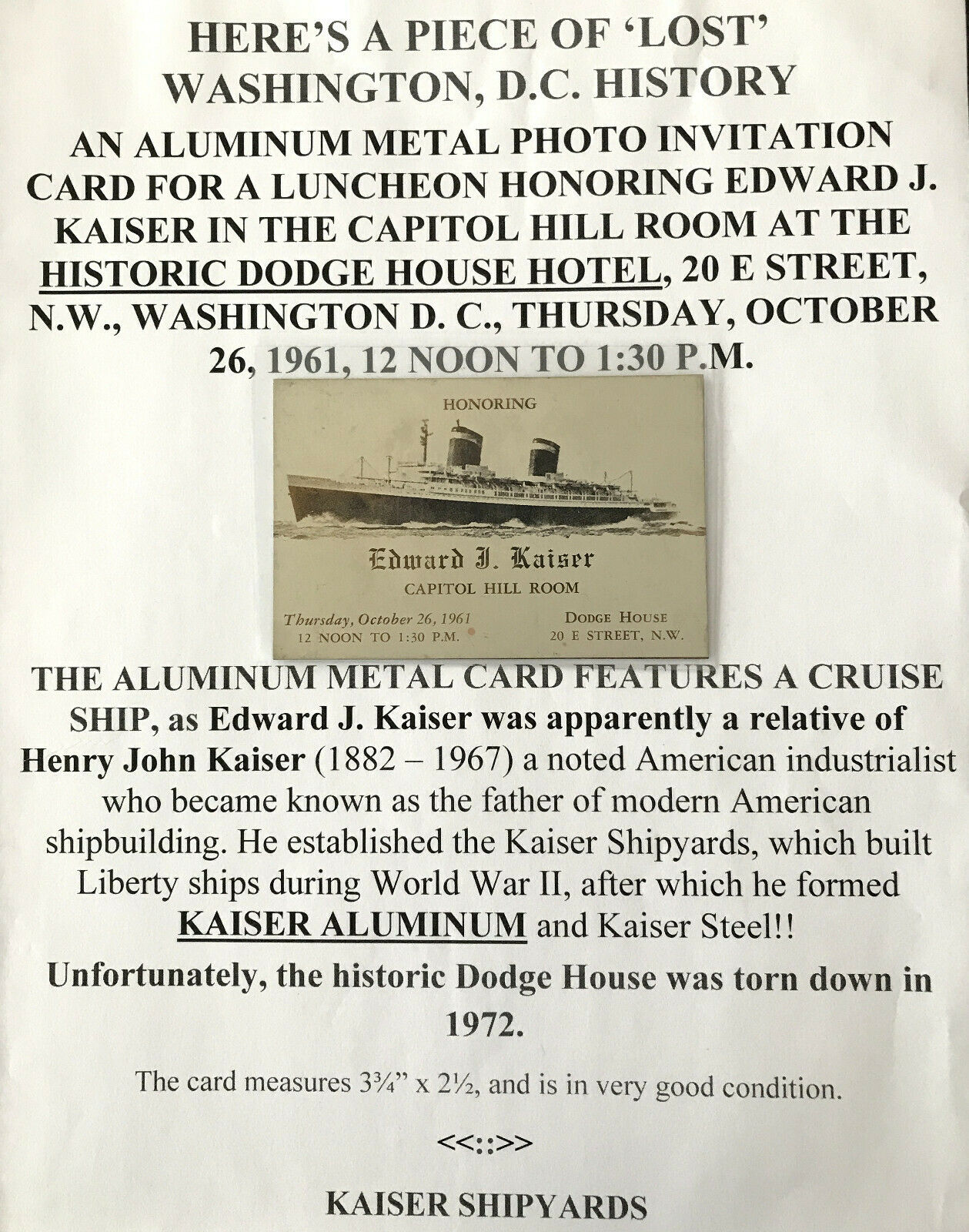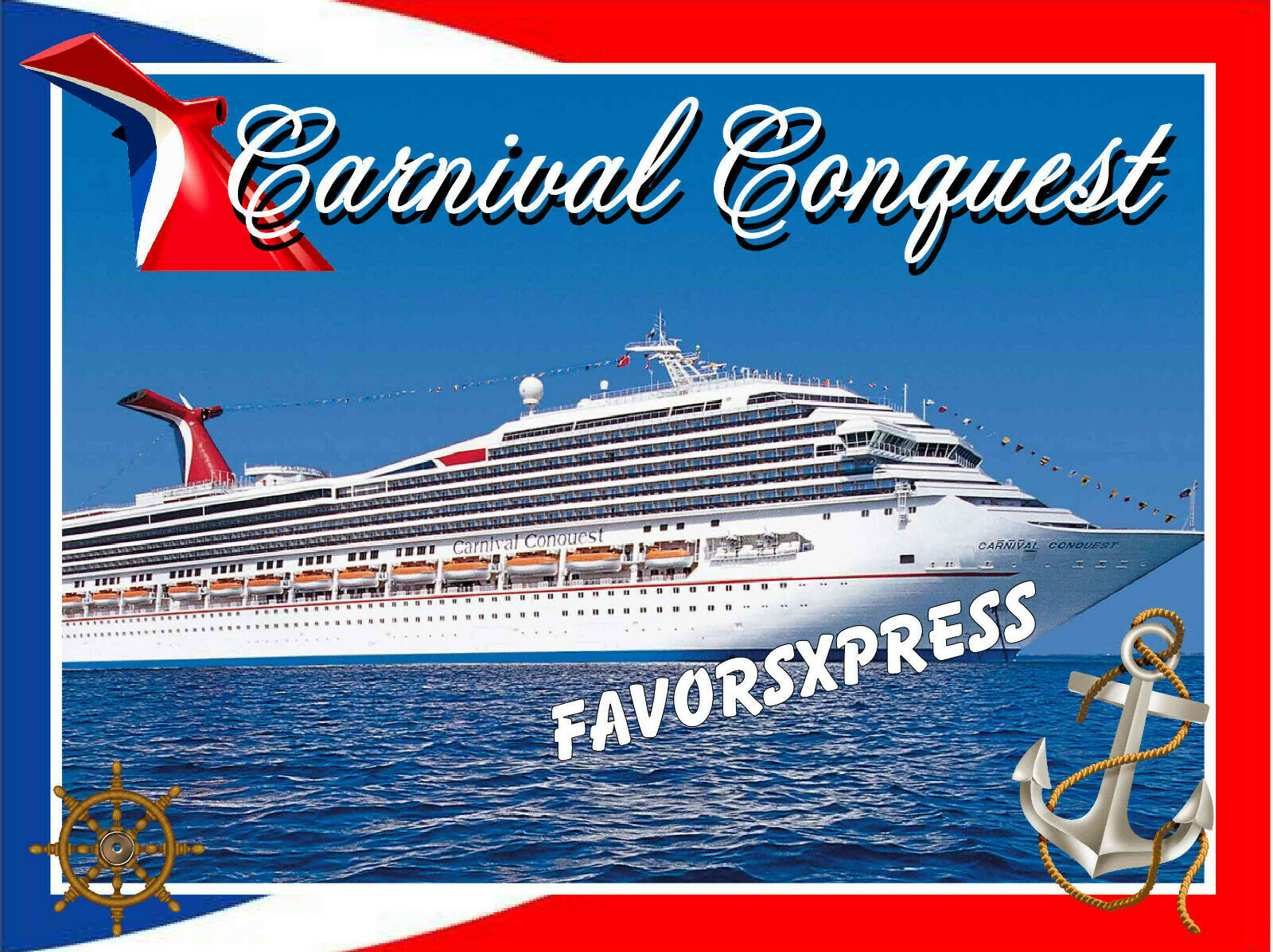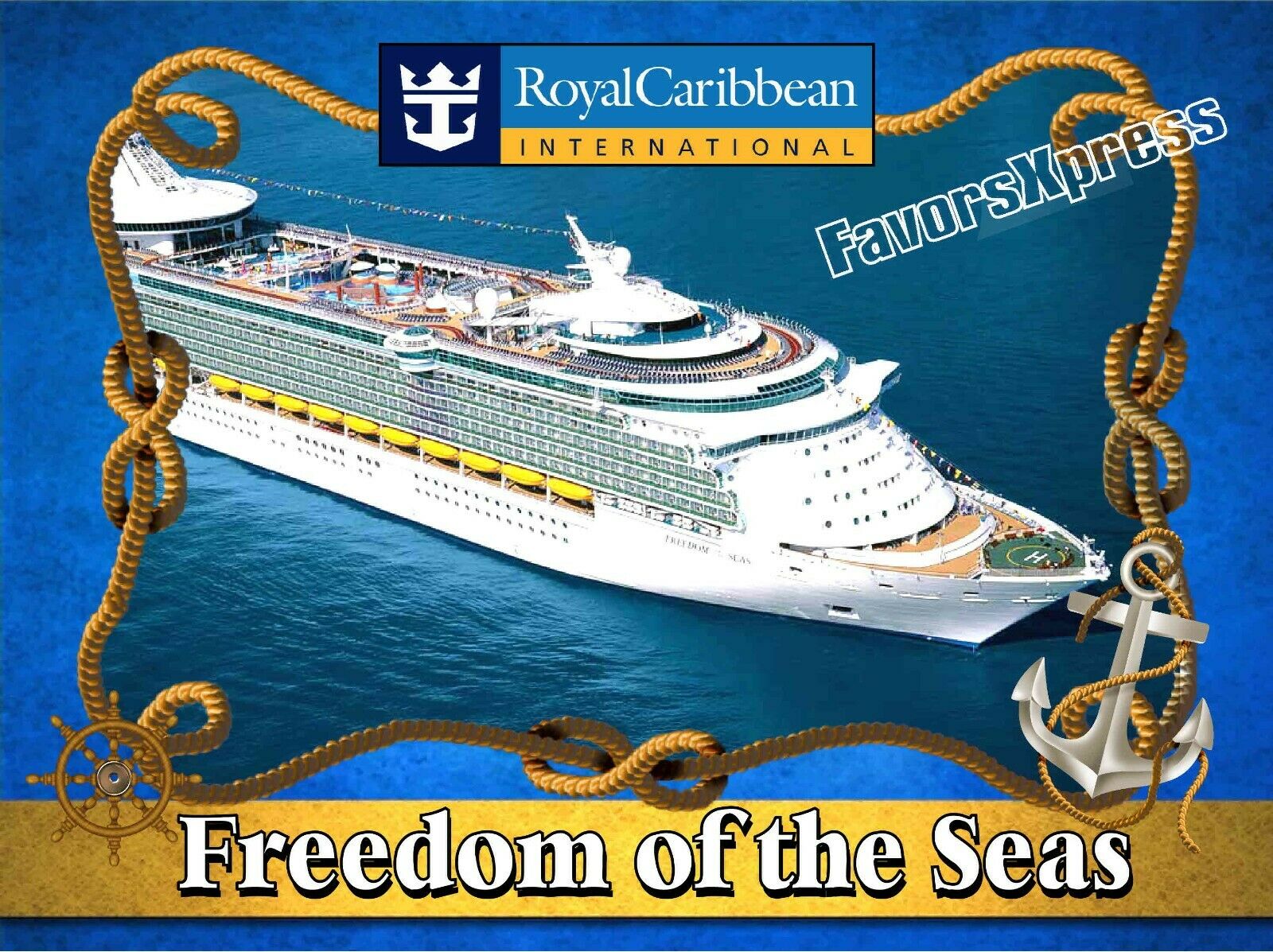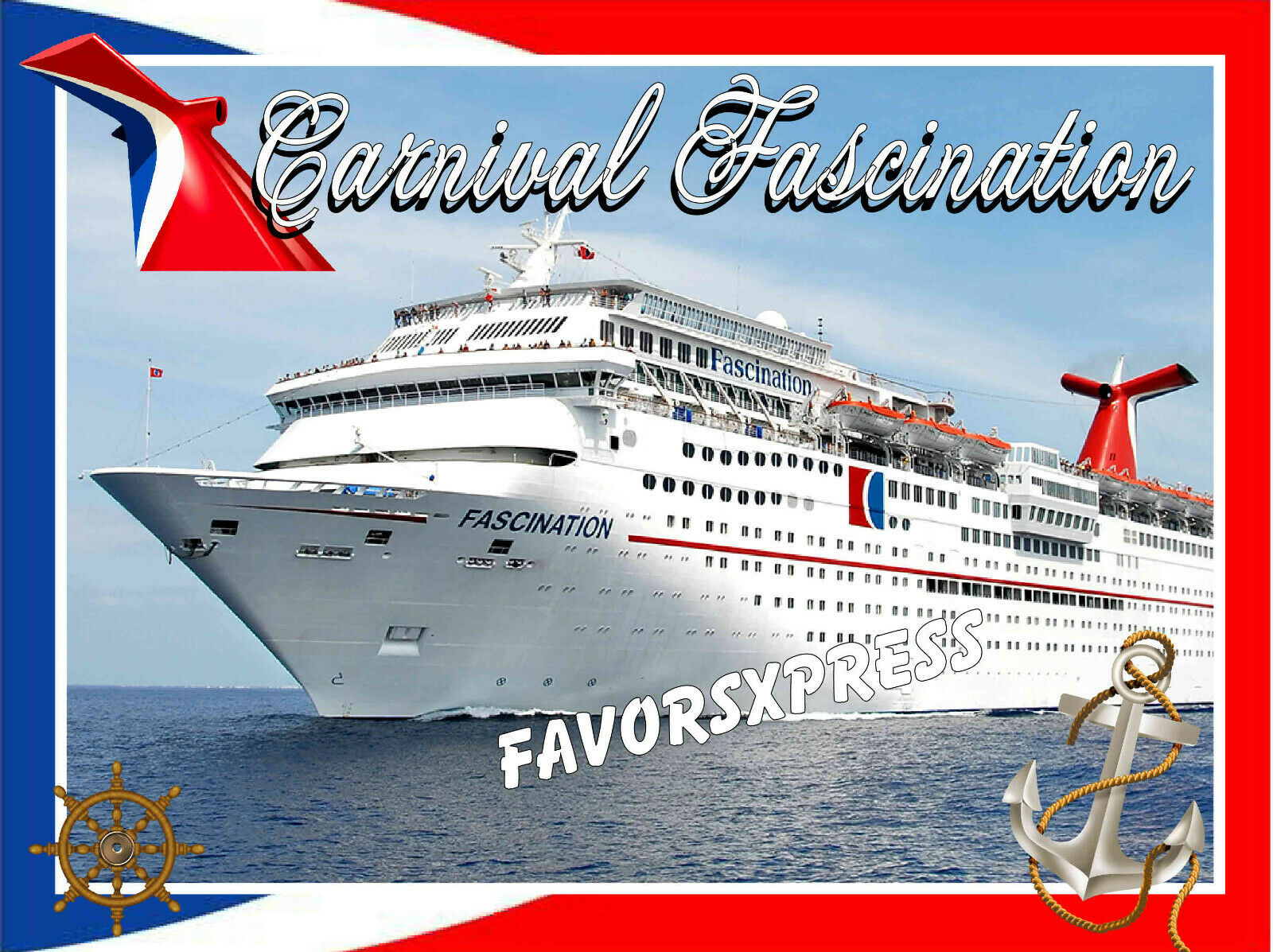-40%
GRACE DODGE HOTEL WASHINGTON DC KAISER ALUMINUM METAL CRUISE SHIP PHOTO CARD '61
$ 4.21
- Description
- Size Guide
Description
HERE’S A UNIQUE PIECE OF ‘LOST
’ WASHINGTON, D.C. HISTORY
AN
ALUMINUM
METAL PHOTO INVITATION CARD FOR A LUNCHEON HONORING EDWARD J. KAISER IN THE CAPITOL HILL ROOM AT THE
HISTORIC DODGE HOUSE HOTEL
, 20 E STREET, N.W., WASHINGTON D. C., THURSDAY, OCTOBER 26, 1961, 12 NOON TO 1:30 P.M.
THE ALUMINUM METAL CARD FEATURES A CRUISE SHIP, as
Edward J. Kaiser was apparently a relative of Henry John Kaiser
(1882 – 1967) a noted American industrialist who became known as the father of modern American shipbuilding. He established the Kaiser Shipyards, which built Liberty ships during World War II, after which he formed
KAISER ALUMINUM
and Kaiser Steel!!
Unfortunately, the historic Dodge House was torn down in 1972.
This aluminum invitation card, which resembles a business card, measures 3¾” x 2½, and is in very fine condition, with some glue residue on the blank verso.
<<
<>
>>
HENRY J. KAISER SHIPYARDS and THE WWII LIBERTY SHIPS
During World War II, the Kaiser Shipyards in Vancouver and Portland turned out 140 Liberty ships, T-2 Tankers, and escort carriers (“baby flat-tops”) for the war effort. The city of Vanport, north of Portland, was built to house the 38,000 workers who migrated to the region from throughout the country to build the ships. The workforce included a large number of African Americans who were recruited in the South and brought to Oregon and Washington by the trainload. The descendants of these workers who stayed after the war formed the core of the area’s African-American population, which added to the region’s cultural diversity.
<<
::
>>
Lost Washington: The Grace Dodge Hotel
By John DeFerrari • April 13, 2011
Magnificent Union Station, opened in 1907, was designed as a ceremonial gateway to Washington, welcoming visitors from far and wide.
In the decades after it was built, countless thousands of newcomers got off their trains and wandered out on to the plaza in front of the station in search of a place to stay. Of the many hotels that were built in the immediate vicinity to accommodate these customers, perhaps the most unusual of them all was the Dodge.
Grace Hoadley Dodge (1856-1914) was born into a wealthy and venerable New York family. She was the granddaughter of William Earle Dodge (1805-1883), co-founder of the Phelps Dodge Mining Corporation, noted advocate for Native American rights, and one of the early supporters of the Young Men's Christian Association in the US.
Grandfather Dodge was known as the "Christian Merchant," and the family had a long association with evangelical Protestant causes. Grace Dodge continued the family tradition of benevolence toward the less fortunate but with a new Progressive-era energy and a special emphasis on women.
Though reportedly an astringent and humorless woman, she nevertheless had great organizational skills. In 1906 she became the first president of the National Board of Young Women's Christian Associations, whose budget deficits she would regularly make up with her personal funds. At her death in 1914, she left 0,000 to the board.
Soon thereafter, the onset of the first World War precipitated a housing crisis in Washington and other east coast industrial areas. By 1ate 1917, some 50,000 new workers had come to the city, overwhelming available facilities.
The federal government built a complex of 13 dormitories for 2,000 women on the west side of the plaza in front of Union Station to address the problem. But the first of these didn't open until December 1918, after the armistice ending World War I had already been signed, and the whole complex wasn't completed until 1920. Nevertheless, it helped ease the Capital's housing shortage until the structures were torn down a decade later.
Meanwhile, the YWCA had joined with 6 other charitable organizations to form the War Work Council to provide assistance to workers, including housing. Among other projects, the council provided funds to the YWCA for construction of a hotel for women in Washington.
A site at North Capitol and E Streets, NW was chosen, and under the leadership of Mrs. John D. Rockefeller, Jr., the new chair of the YWCA Board, the hotel was constructed. Like the Union Plaza dormitories across North Capitol Street, it was too late to help in the war. The 8-story, 376-room hotel was completed and opened in October 1921.
Designed by New York architect Duncan Candler (1873-1949), the Grace Dodge was stately and elegant but restrained in décor. It was finished in tan brick with limestone trim and featured an enormous three-story tall entrance-way with a neoclassical pediment broken by third-story windows.
In contrast with—or perhaps to complement—its other facilities that aimed to help disadvantaged young women, the Grace Dodge Hotel was conceived from the start as a for-profit enterprise, intended to be managed and operated by an entirely female staff.
It offered professional women traveling alone to the Capital a top-notch hotel experience, free from the harassment by men that they would undoubtedly suffer anywhere else. As summarized in
The Washington Post
,
The Grace Dodge Hotel, as it is to be called in honor of the woman who did so much for her sex, will have all the useful and attractive features that any hotel has, excepting men, and the housing committee of the "Y," of which Mrs. John D. Rockefeller, Jr., is chairman, guarantees that the staff and working force of women will be every bit as efficient and courteous as the best masculine staff could be. And the hotel has some conveniences that no other public stopping-place has offered to date.
There are special suites for mothers, with heaters for baby's milk, and cribs constructed on sanitary principles. There will be a nurse on call, to be paid for by the hour. There are valeting rooms where the woman who wants her tumbled blouse laundered in a hurry can slip in and do it herself, at the cost of a small sum for the use of the tubs and electric iron. There are shampoo basins, and the guest may wash her own hair. There are vanity parlors for those who care about their complexions, and there is to be an information service where the visitor can find out what debate is on in the House of Representatives and what the Senate is doing about that bill she is interested in....
Each floor had a sitting room for quiet socializing in the blissful absence of men, and, perhaps most conveniently of all, when the overworked bellhop finished hauling all that heavy luggage up to your room, you didn't have to tip her. In fact, tipping of any kind to hotel employees, even in the restaurant and lounge, was strictly prohibited.
Tipping has a surprisingly controversial history in America, considering how pervasive and accepted the practice is now. The practice apparently had started in England when visitors to private estates would pay gratuities to servants to compensate them for extra services performed beyond their regular duties.
By the late 19th century, the practice was common in wealthy homes in America, and from there it seems to have spread broadly into business settings where "servants" of one kind or another performed services. Even as it firmly took hold, the practice was widely condemned as degenerate and un-American, because it was seen as a reflection of the class-bound society of the Old World—an attempt by the lower classes to fleece the upper. Ironically, Americans, then as now, had a reputation for tipping more generously than their European peers.
Against this complex social background, the Grace Dodge Hotel was established as a model of business virtues, the only first-class hotel in America to adopt a no-tip policy. Hotel manager Mary A. Lindsley (1876-1949) remarked in an
American Magazine
article in 1929 that "Fifty years from now tipping in this country will be practically abolished.... This hotel is just pointing the way, it can be done."
At that time, the hotel paid wages comparable to the minimum paid by the federal government. Hotel chambermaids earned per month, as did entry-level government clerks, whereas they would earn only a month in hotels where they could accept gratuities. Bellboys (the all-female staff policy does not seem to have lasted long) got at the Grace Dodge, as opposed to the to in other hotels.
An early problem encountered at the hotel was that patrons would stubbornly leave tips despite the prohibition against them. Waitresses in the restaurant would find coins left for them under plates, for example. This was a serious problem. A meeting of all hotel staff was held in January 1922, and everyone agreed that the unsolicited tips would be donated to the Phyllis Wheatley YWCA center for the benefit of its African-American members.
The hotel's tipless policy was widely publicized and undoubtedly contributed to its success. The restaurant and lounge on the first floor were open to men, and manager Lindsley reported within the first year that these facilities were reserved at least as often by organized groups of men as by women.
Lindsley, who had previously served as a hospital director with American forces during the war and more recently as head of the dining hall at the Union Plaza dormitories, was the driving force behind the hotel's success in its early days. She had sought out the manager position when she first saw the building going up, and she left an indelible stamp on its efficient, by-the-book, economical operations.
When the
American Magazine
reporter asked her how she could afford to pay her staff so much more than other hotels, she characteristically pointed to the fact that none of the employees got any special privileges. "All employees live outside unless they pay guest-rates for rooms. Nobody gets free meals. I, as manager, pay like everyone else..." The strict implementation of the hotel's business and moral principles was the key to its success, she implied.
The heady idealism of Miss Lindsley and the Grace Dodge Hotel could lead occasionally to sticky situations, as when the hotel's newsstand concessionaire, a Mr. Andrew G. Pollock, filed suit against the establishment in November 1922. He claimed his contract had been terminated because he was selling tobacco products, which he said the contract allowed. He suggested to the press that he was providing an important service to the women smokers in the hotel who wanted to purchase cigarettes discreetly.
Lindsley retaliated by asserting firmly that tobacco products never had been nor would ever be sold in her hotel, but she soon found her iron principles conflicting with one another. As quoted in the
Post
, she asserted:
In the first place there is no demand by the type of women who patronize this hotel for such things. We have no rule against smoking, but I think since the hotel has opened, I have seen women smoking here not more than five times. We would not interfere with the guests, as they are free agents, but we will not have things for them to smoke....
She went on to say that the YWCA board wanted a woman to be the newsstand concessionaire so that more feminine things would be stocked, like "hair nets, needles and thread, candy, writing paper, dainty handkerchiefs and similar articles." Ultimately the judge decided to split the difference, allowing the hotel's ban on the sale of tobacco products but directing that Pollock's contract be reinstated.
More compromises were soon necessary. After just three years, the women-only policy fell by the wayside, although the no-tipping rule continued to attract a steady clientele. In 1936, after 15 years of service, Lindsley resigned to take charge of a new inn being built in historic Williamsburg, VA, and her departure marked the end of the hotel's golden age.
At some point the name was changed to just the "Dodge Hotel," and the YWCA sold it by the mid 1940s. In 1949 it was in the hands of a group of private investors, and a former Waldorf Astoria manager had been installed to run it.
Apparently all the special rules were gone by this time. In fact, in December of that year, hotel service and food workers voted to strike over poor wages and working conditions, a predicament that surely would never have arisen under Mary Lindsley and the YWCA.
The hotel continued to operate for another 22 years. In the 1940s and 1950s, its tea garden was a popular and quiet gathering place in what was a busy part of town. Then in 1959 a set of local investors bought and remodeled the hotel as the Dodge House, sandblasting the venerable building's brick and stone facade, paving over the garden as a parking lot, and fitting out a new lounge inside. In 1963 the dimly-lit bar, called The Place On The Hill, featured the Van Perry Trio, a jazz group that tended toward a Latin beat. The times were changing.
The end of the road came for the Dodge Hotel in 1972, when new owners decided to raze it to make room for a more profitable office building. In addition to ,000 chandeliers, the going-out-of-business sale for the hotel featured a set of hand-carved doors said to have been installed by Robert F. Kennedy when a Kennedy-For-President office was located at the Dodge.
The large 400 North Capitol Plaza office complex, still standing today, was subsequently constructed on the sites of the Dodge Hotel and the Hotel Continental, which had occupied the adjacent lot on North Capitol Street and was also torn down in 1972.
Sources for this article included James M. Goode,
Capital Losses
(2003); Constance McLaughlin Green,
Washington: A History of the Capital, 1800-1950
(1962); A.K. Sandoval-Strausz,
Hotel: An American History
(2007); Kerry Segrave,
Tipping
(1998); and numerous newspaper and magazine articles.
I am a proud member of the Universal Autograph Collectors Club (UACC), The Ephemera Society of America, the Manuscript Society and the American Political Items Collectors (APIC) (member name: John Lissandrello). I subscribe to each organizations' code of ethics and authenticity is guaranteed. ~Providing quality service and historical memorabilia online for over twenty years.~
WE ONLY SELL GENUINE ITEMS, i.e., NO REPRODUCTIONS, FAKES OR COPIES!
Historic preservation
Industrial History
Shipbuilding











